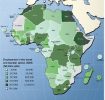With over one billion young people set to enter the global labour market over the next decade, many policy makers and development practitioners see hospitality and tourism as a key growth sector in Africa.
However, perceptions regarding the sector need to shift if African countries hope to unlock its full economic potential, according to a new youth-led research report released today by Restless Development and the Mastercard Foundation Youth Think Tank (YTT).
The report, Harnessing the Potential of Hospitality and Tourism for Young People’s Employment, calls on sector stakeholders to address the gaps that challenge young people’s ability to secure and retain opportunities in the sector.
Key Learning from the Hospitality and Tourism Research
• Some young people have negative perceptions about the hospitality and tourism sector and are unable to see its potential for income generation and career growth. Those who are working in the sector do so for a variety of reasons, including the chance to earn a decent income, enjoy a job that is interesting, and contribute to national goals.
• Young people struggle to find opportunities to gain practical experience prior to entering the job market. While employers prefer candidates with formal training, this is often complemented with on-the-job training to familiarize the employee with the companies’ systems and processes.
• Employers and employees agree that soft skills are key to hiring, retention, and promotion. Three soft skills employers want young employees to possess are work ethic, positive attitude, and interpersonal skills.
• Employers in the sector struggle to retain young employees, particularly those from urban areas and young women for reasons unique to each group. Young women also may have family and communal responsibilities that may make it difficult for them to retain full-time employment.
• Governments must prioritize youth engagement and sector development by providing resources that help youth shape the agenda and sector policy.
• The report makes recommendations on how to improve the sector and its image for young people. However, there is no one actor who can solve these challenges independently. To make these improvements, better collaboration is required among sector stakeholders-government, private sector employers, training institutions, young people, donors, and NGOs with an interest in the sector.
The report, presented by the YTT at an event organized by Restless Development and the Foundation, looks at the challenges and opportunities faced by young people working in the industry. Mastercard Foundation believes that since young people are closest to the employment challenge they face, they are also closest to the solution. The Youth Think Tank (YTT) was established in 2012 to ensure young people were meaningfully engaged in research on key employment issues affecting youth in Africa.
“The report’s findings about how youth perceive the hospitality and tourism sector will provide valuable insight into how we design and implement current and future programs on the continent. We have placed youth at the centre of our new Young Africa Works strategy and we will continue to listen to their voices and engage them at every stage of our work,” said Peter Materu, Chief Programs Officer, Mastercard Foundation.
Restless Development, a youth-powered international development agency, recruits, trains, and supports the researchers. This year’s cohort comes from Rwanda, Uganda, Kenya, Tanzania, Malawi, Ghana and Zambia, and range in age from 19-25. More than just researchers, they are trained as advisors and consultants equipped with skills that will enable them to provide strategic support on how to design, implement, and evaluate youth engagement in programs.
“This research process was a mind-opening experience for me. With each stage, I kept learning new and exciting research methods, and I feel that I am a better researcher now. I intend to be an agent of change by mentoring and assisting fellow young people, passing on to them the knowledge and skills that were given to me,” said Angela Joshua Kileo, 24, YTT member from Tanzania.
“Speaking with young people and industry players in the hospitality and tourism sector, I experienced firsthand that this sector is transforming young people’s livelihoods in my country. I believe that it is important to learn more about this sector because I see it as being at the center of our journey to economic transformation, and I truly believe that with youth leadership in this sector, more can be done to harness its potential,” said, Peace Aradukunda, 23, YTT from Rwanda.
The research methodology included key informant interviews and focus group discussions as well as quantitative survey data from 350 respondents across seven countries. It captures the unique voices of young people using a peer-to-peer approach, where young people lead every step of the process.

